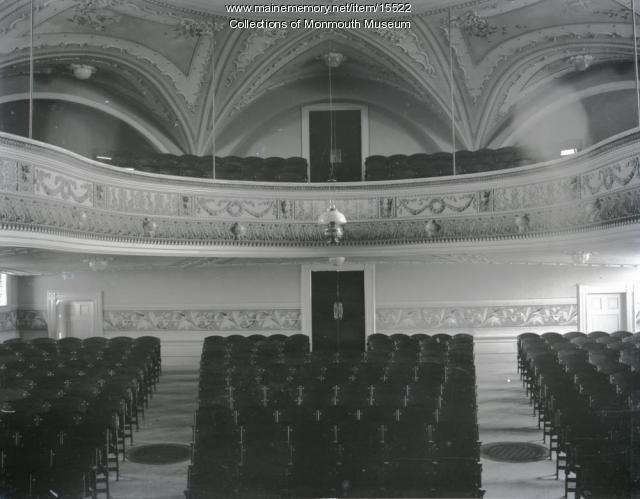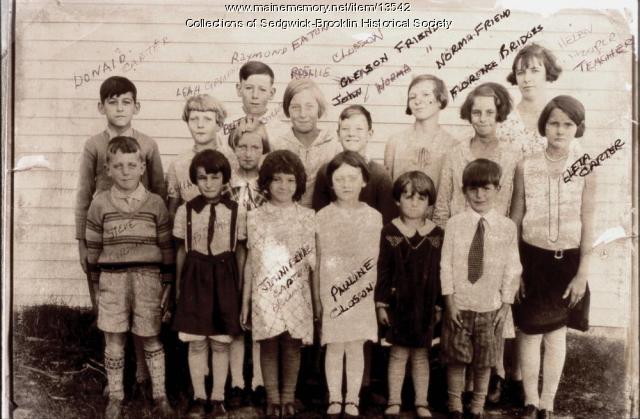Keywords: Early business
- Historical Items (323)
- Tax Records (0)
- Architecture & Landscape (0)
- Online Exhibits (109)
- Site Pages (289)
- My Maine Stories (17)
- Lesson Plans (1)
Online Exhibits
Your results include these online exhibits. You also can view all of the site's exhibits, view a timeline of selected events in Maine History, and learn how to create your own exhibit. See featured exhibits or create your own exhibit
Exhibit
Prohibition in Maine in the 1920s
Federal Prohibition took hold of America in 1920 with the passing of the Volstead Act that banned the sale and consumption of all alcohol in the US. However, Maine had the Temperance movement long before anyone was prohibited from taking part in one of America's most popular past times. Starting in 1851, the struggles between the "drys" and the "wets" of Maine lasted for 82 years, a period of time that was everything but dry and rife with nothing but illegal activity.
Exhibit
After the canoe, steamboats became the favored method of transportation on Moosehead Lake. They revolutionized movement of logs and helped promote tourism in the region.
Exhibit
Maine's natural resources -- granite, limestone and slate in particular -- along with its excellent ports made it a leader in mining and production of the valuable building materials. Stone work also attracted numerous skilled immigrants.
Exhibit
Princeton: Woods and Water Built This Town
Princeton benefited from its location on a river -- the St. Croix -- that was useful for transportation of people and lumber and for powering mills as well as on its proximity to forests.
Exhibit
Music in Maine - Country Music
"… Curless to take frequent breaks from the music business, where he returned to Maine to recuperate."
Exhibit
Passamaquoddy Indians from Washington County traveled to Portland in 1920 to take part in the Maine Centennial Exposition. They set up an "Indian Village" at Deering Oaks Park.
Exhibit
Rum, Riot, and Reform - 1620 to 1820: New England's Great Secret
"Alcohol production and importation became a business to those settling in the Province of Maine. In the region, which was annexed by Massachusetts in…"
Exhibit
Poland Spring: Summering in Fashion
During the Gilded Age at the end of the nineteenth century, Americans sought to leave increasing urban, industrialized lives for the health and relaxation of the country. The Poland Spring resort, which offered a beautiful setting, healing waters, and many amenities, was one popular destination.
Exhibit
A Celebration of Skilled Artisans
The Maine Charitable Mechanic Association, an organization formed to promote and support skilled craftsmen, celebrated civic pride and members' trades with a parade through Portland on Oct. 8, 1841 at which they displayed 17 painted linen banners with graphic and textual representations of the artisans' skills.
Exhibit
Maine's corn canning industry, as illuminated by the career of George S. Jewett, prospered between 1850 and 1950.
Exhibit
History in Motion: The Era of the Electric Railways
Street railways, whether horse-drawn or electric, required the building of trestles and tracks. The new form of transportation aided industry, workers, vacationers, and other travelers.
Exhibit
From the last decades of the nineteenth century through about the 1920s, vacationers were attracted to large resort hotels that promised a break from the noise, crowds, and pressures of an ever-urbanizing country.
Exhibit
Waldoboro Fire Department's 175 Years
While the town of Waldoboro was chartered in 1773, it began organized fire protection in 1838 with a volunteer fire department and a hand pump fire engine, the Water Witch.
Exhibit
Independence and Challenges: The Life of Hannah Pierce
Hannah Pierce (1788-1873) of West Baldwin, who remained single, was the educated daughter of a moderately wealthy landowner and businessman. She stayed at the family farm throughout her life, operating the farm and her various investments -- always in close touch with her siblings.
Exhibit
Music in Maine - Radio Cowboys and Country Music
"… with tent shows and appeared for promotions, like business openings. He recalled, "I can remember one time appearing with the show over 80…"
Exhibit
From French Canadians to Franco-Americans
French Canadians who emigrated to the Lewiston-Auburn area faced discrimination as children and adults -- such as living in "Little Canada" tenements and being ridiculed for speaking French -- but also adapted to their new lives and sustained many cultural traditions.
Exhibit
Desserts have always been a special treat. For centuries, Mainers have enjoyed something sweet as a nice conclusion to a meal or celebrate a special occasion. But many things have changed over the years: how cooks learn to make desserts, what foods and tools were available, what was important to people.
Exhibit
Maine's ample woods historically provided numerous game animals and birds for hunters seeking food, fur, or hides. The promotion of hunting as tourism and concerns about conservation toward the end of the nineteenth century changed the nature of hunting in Maine.
Exhibit
Music in Maine - Opera, Orchestras and Stages
"Lucy and Bruce Poolaw were partners in life and business. They pushed for the betterment of the Penobscot for their entire lives."
Exhibit
Following his historic flight across the Atlantic in May 1927, aviator Charles Lindbergh commenced a tour across America, greeted by cheering crowds at every stop. He was a day late for his speaking engagement in Portland, due to foggy conditions. Elise Fellows White wrote in her diary about seeing Lindbergh and his plane.
Exhibit
Rum, Riot, and Reform - Women Leaders and Temperance
"GALLERIES: Politics and Enforcement | Women Leaders and Temperance | Quenching the Thirst | Business as Usual"
Exhibit
Rum, Riot, and Reform - Quenching the Thirst
"GALLERIES: Politics and Enforcement | Women Leaders and Temperance | Quenching the Thirst | Business as Usual"
Exhibit
Immigration is one of the most debated topics in Maine. Controversy aside, immigration is also America's oldest tradition, and along with religious tolerance, what our nation was built upon. Since the first people--the Wabanaki--permitted Europeans to settle in the land now known as Maine, we have been a state of immigrants.
Exhibit
Reading, Writing and 'Rithmetic: Brooklin Schools
When Brooklin, located on the Blue Hill Peninsula, was incorporated in 1849, there were ten school districts and nine one-room school houses. As the years went by, population changes affected the location and number of schools in the area. State requirements began to determine ways that student's education would be handled. Regardless, education of the Brooklin students always remained a high priority for the town.
























